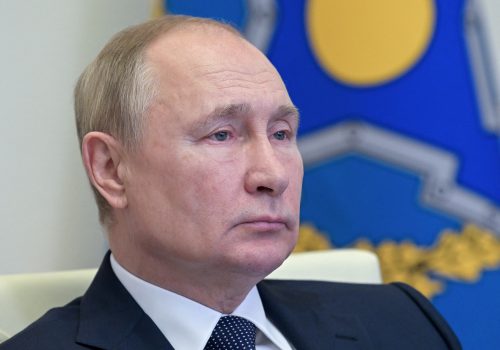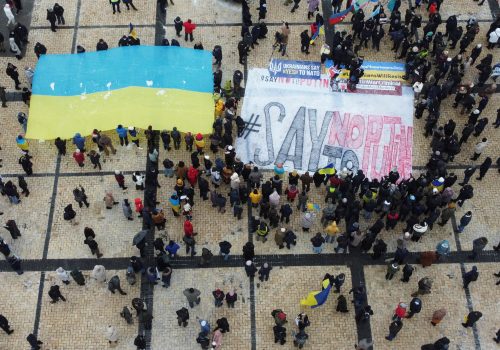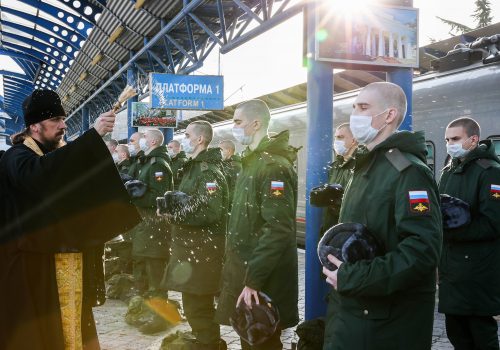FAST THINKING: A big week of diplomacy with Russia is over. What’s Putin’s next move?
GET UP TO SPEED
They’re all talked out. From Geneva to Brussels to Vienna, high-stakes meetings between Russian officials and their Western counterparts this week failed to produce any meaningful breakthroughs. Western allies made it clear that they won’t give into Kremlin demands for Europe to rewrite its security architecture. Now, with Russian troops still poised to invade, it’s up to Vladimir Putin to make the next move. As the diplomats disperse, our experts weigh in on whether the Russian president got the message, what might happen if he refuses to accept it, and whether war in Europe is now more or less likely.
TODAY’S EXPERT REACTION COURTESY OF
- Melinda Haring (@melindaharing): Deputy director of the Eurasia Center
- Alexander “Sandy” Vershbow (@ARVershbow): Distinguished fellow, former US ambassador to Russia, and former deputy secretary general of NATO
- Barry Pavel (@BarryPavel): Director of the Scowcroft Center for Strategy and Security and former top US Defense Department and National Security Council official
The decider
- This was a week of drawing red lines on the top issue dividing the two sides, with Russia demanding that NATO not be allowed to expand and the United States and its NATO allies rejecting that notion. “It’s crystal clear that everything is being relayed back to Putin to decide,” Melinda tells us. “The Russian negotiating team didn’t have any room to negotiate about the real issue, which is NATO.”
- Sandy says US President Joe Biden should communicate “forcefully” with Putin—in writing and in a potential call—that Russia’s demands are unacceptable. “Let’s be deliberate and maintain the united front with our allies, continue to spell out the costs to Russia, and see whether they return to the table.”
The big question
- We put the big question on everyone’s minds to our experts: Is war more or less likely after this week’s flurry of diplomacy? They were unanimous in their response:
- Sandy says: “War is more likely, but still not inevitable. The Russians remain on a war footing and are likely to keep up the pressure to see if they can scare NATO and Ukraine into concessions without the use of force. The West must hold steady and continue to press Moscow to continue talking on a diplomatic way out.”
- Melinda says: “Regrettably war is more likely. We’ve reached a real impasse. As things stand, the Russian and US positions are irreconcilable.”
- Barry says: “War is more likely for the following reasons: First, Russia never expected NATO to agree to its unacceptable demands, which were simply a fig leaf of justification for Putin’s desire to further invade Ukraine and try to cement his place in Russian history. Second, the sizable Russian forces positioned at the Ukrainian border in recent weeks were already more than sufficient to signal that Russia is serious and cause the United States and its NATO allies to engage in diplomacy. The ongoing transport of massive amounts of Russian military equipment from eastern Russia to western Russia near Ukraine likely can only be for the purposes of supporting a significant military operation into Ukraine.”
NATO’s moment
- Sandy says the Alliance should continue to negotiate on arms control or “perhaps be more transparent about NATO’s internal processes” when it comes to admitting new members—since Ukraine isn’t going to join anytime soon. But it cannot “accept the idea that Russia can dictate who can join NATO and who can’t.”
- The “irony of all this,” Sandy adds, is how the crisis has raised awareness regarding Ukraine’s long-stalled attempt to join NATO. Polls show increasing support for NATO membership among the Ukrainian public, and there are even rumblings in Sweden and Finland about joining the Alliance. “The Russians, [through] their belligerence and threats and ultimatums, are driving up support for NATO in all kinds of places,” he says.
- There’s another way for NATO and the United States to help deter an invasion and show resolve, Barry points out: A “sustained information campaign” designed to weaken Putin at home by informing “the Russian people about Putin’s ongoing, massive corruption and theft of billions of dollars from the Russian people for himself, his immediate family, and his cronies.”
Boots on the (not-so-frozen) ground
- While some 100,000 Russian troops remain massed along the Ukrainian border, Melinda says “US intelligence expected more Russian troops at this point, and the mild winter means that the ground isn’t frozen, which limits the ability to move tanks easily.” Still, she adds, the presence of Russian helicopters near Ukraine is worrying.
- Full-scale war remains “a live option,” according to Melinda, but “more likely Putin will strike Ukraine in a way short of war that will cause Europe to wring its hands but stop short of unleashing its harsh package of sanctions.”
- Barry also has concerns further afield: a Russian invasion that leads to China “moving opportunistically” in its own region. He advises “diplomacy that makes it very clear that US and allied military capabilities in the Indo-Pacific remain very well-prepared to deal with any Chinese coercive actions vis-à-vis Taiwan.”
Further reading
Mon, Jan 10, 2022
The US and NATO must attack Vladimir Putin’s intimidation strategy
UkraineAlert By
The current US approach to the crisis with Russia is predictable and conventional. The principle author of the "shock and awe" doctrine, Harlan Ullman, believes it is time to turn Putin's intimidation tactics against him.
Sun, Jan 9, 2022
Can the US avoid both appeasement and war? This week’s Russia talks will be revealing.
Inflection Points By Frederick Kempe
By this week’s end, the United States and its allies likely will know whether Vladimir Putin is willing to negotiate or whether he’s determined to escalate.
Sun, Jan 9, 2022
How to make a Russian invasion of Ukraine prohibitively expensive
UkraineAlert By Andriy Zagorodnyuk
Bolstering Ukraine's ability to wage an effective asymmetric campaign on home soil may be the most effective way to deter Russian President Vladimir Putin from launching a full-scale invasion of Ukraine.
Image: Russia Vladimir Putin takes part in an emergency session of the Collective Security Treaty Organisation (CSTO) Collective Security Council meeting on the normalization of the situation in Kazakhstan on January 10, 2022. Photo via the Kremlin/EYEPRESS.


